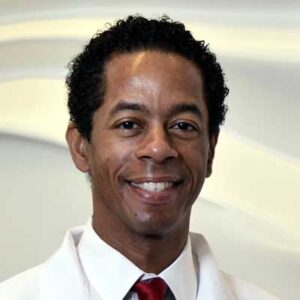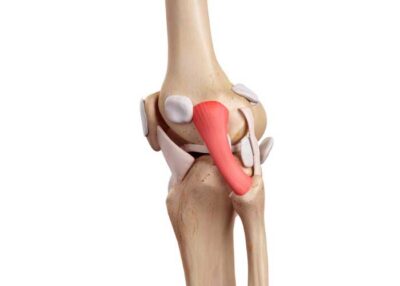LCL Reconstruction and Repair Surgeon

Do you play contact sports? LCL injuries usually occur from trauma, due to a great amount of force applied to the inner part of the knee and is often seen in football players. If the LCL is stretched or torn, an LCL repair or reconstruction may be needed to restore knee stability. LCL reconstruction surgeon, Doctor Riley J. Williams provides diagnosis as well as surgical and nonsurgical treatment options for patients in Manhattan, Brooklyn, New York City and surrounding areas who have sustained an LCL injury. Contact Dr. Williams’ team today!
What is the lateral collateral ligament (LCL)?
The lateral collateral ligament (LCL) is a thin band of tissue found on the lateral (outer) side of the knee. The LCL is sometimes referred to as the fibular collateral ligament (FCL) because it connects the femur (thigh bone) to the fibula, (the smaller bone in the outer, lower half of the leg). The LCL is one of the four major ligaments involved in stabilizing the knee joint. The LCL allows for controlled sideways movement of the knee, and helps prevent excessive bowing of the knee when stress is placed on the knee. Lateral collateral ligament injuries may be caused by direct trauma to the inner knee joint, which can apply pressure to the LCL and force it to stretch or tear beyond its capacity. LCL injuries, depending on the severity, typically require surgery. Dr. Riley J. Williams, orthopedic knee surgeon serving patients in Manhattan, Brooklyn, New York City, NY and surrounding areas, has extensive experience diagnosing and treating patients with LCL injuries.
What is LCL reconstruction?
Lateral collateral ligament (LCL) reconstruction is an open surgical procedure performed to repair a stretched or torn LCL. This surgical treatment cannot be performed arthroscopically due to the position of the ligament which exists outside of the knee joint. Dr. Williams typically recommends this surgery be performed for patients who have experienced a significant lateral collateral ligament tear, patients who experience severe knee instability, or those who have been unable to alleviate the symptoms of an LCL tear through non-surgical methods. LCL reconstruction makes use of a tissue graft to replace the injured ligament. Tissue grafts used for LCL reconstruction can be taken from a donor (allograft) or taken from another area from the patient’s own body (autograft).
During this surgical treatment, a small, open incision is created in the knee to allow Dr. Williams to get an unobstructed view of the damaged ligament and surrounding tissues. If possible, Dr. Williams may repair the damaged ligament. LCL reconstruction is performed by creating precise small drill holes in the femur and fibula; the reconstructed LCL mimics the anatomic location of the native ligament. Dr. Williams will then thread the donor tissue through these small holes and secure the new ligament in place with special surgical sutures and screws. Dr. Williams takes care to ensure that the tissues are taut and positioned carefully. His extensive experience in performing an LCL reconstruction gives the treated patient the best chance at optimal recovery.
What is a lateral collateral ligament (LCL) Repair?
If the patient has experienced a fraying of the tissue, or in the case of a grade 1 or grade 2 ligament tear, Dr. Williams may recommend LCL repair instead of LCL reconstruction. This surgical treatment is performed as an open surgery, using a small incision. During this procedure, Dr. Williams repositions the ligament into the correct anatomical position and uses surgical sutures, screws, or staples as needed to reconnect and restabilize the ligament tissue. Lateral collateral ligament repair is an excellent option for patients who recently injured their LCL, or patients with less severe tears or who have experienced excessive stretching of the LCL. Patients must see an experienced surgeon if they have suffered an LCL injury. Dr. Williams can evaluate the injury and perform the correct, meticulous procedure for the patient’s best chance at full recovery.
How long does it take to recover from LCL reconstruction surgery?
Following a lateral collateral ligament (LCL) reconstruction, patients in Manhattan are advised to be careful, and to follow the post-operative rehabilitation program provided by Dr. Williams. Recovery time will vary from patient to patient and will be affected by underlying medical conditions, patient’s age, activity level prior to surgery.
In general, patients can expect to be placed in a knee brace to allow the joint and ligament to heal. Crutches are typically recommended for 2-3 weeks following surgery. Afterward, patients are recommended to perform the following actions:
- Rest, ice, and elevate the joint to help alleviate pain and swelling
- Passive knee exercises, followed by active knee exercises as recommended
- Pain medication will be prescribed to ease pain and must be taken as instructed
- Simple, easy movements should be performed during the first phase of healing to increase flexibility
- Avoid any strenuous, strength-building activities for the first 4-6 weeks
After one week, patients will begin a physical therapy program that includes stretching, range of motion exercises, and patellar mobilization. After six weeks, the PT program moves to a leg strengthening phase. Physical therapy is performed to aid in healing, increasing strength and flexibility, and to obtain the range of motion enjoyed prior to their injury. Healing from lateral collateral ligament (LCL) reconstruction is a slow process that must not be rushed. Patients will visit Dr. Williams periodically throughout the healing process to ensure that the new ligament is healing appropriately. On average, patients are allowed to participate in their regular sporting activities in about 6 months. Dr. Williams will recommended that patients wear a supporting brace during sporting and strenuous activities for up to a year after surgery to protect the joint.
For more information about lateral collateral ligament (LCL) reconstruction or repair or for additional resources regarding knee ligament injury treatments, please contact the office of Riley J. Williams, MD, orthopedic knee surgeon serving Manhattan, Brooklyn, New York City, NY and surrounding areas.
Locations
610 W 58th Street
New York, NY 10019
148 39th Street, 7th Floor
Brooklyn, NY 11232



